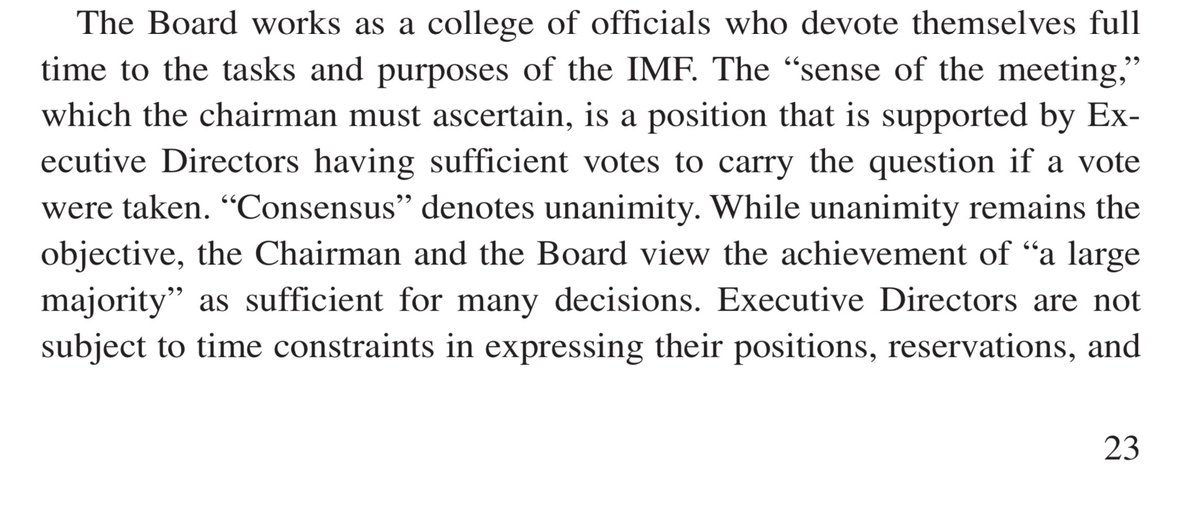Excellent thread from @ErikVoeten on the WHO and how the institutional structure of global governance shapes outcomes and hinders the effectiveness of the WHO, as is the case w/ so many international organizations.
A couple of caveats re: the IMF analogy, though (1/n): https://twitter.com/ErikVoeten/status/1250395924439928833">https://twitter.com/ErikVoete...
A couple of caveats re: the IMF analogy, though (1/n): https://twitter.com/ErikVoeten/status/1250395924439928833">https://twitter.com/ErikVoete...
2/ The IMF doesn’t really “control” its own “pot of money.” It is ~a credit union. The pot consists of quota contributions of members, & loans must be approved by the Executive Board where 8 countries hold their own seats ( https://abs.twimg.com/emoji/v2/... draggable="false" alt="🇺🇸" title="Flag of United States" aria-label="Emoji: Flag of United States">
https://abs.twimg.com/emoji/v2/... draggable="false" alt="🇺🇸" title="Flag of United States" aria-label="Emoji: Flag of United States"> https://abs.twimg.com/emoji/v2/... draggable="false" alt="🇯🇵" title="Flag of Japan" aria-label="Emoji: Flag of Japan">
https://abs.twimg.com/emoji/v2/... draggable="false" alt="🇯🇵" title="Flag of Japan" aria-label="Emoji: Flag of Japan"> https://abs.twimg.com/emoji/v2/... draggable="false" alt="🇩🇪" title="Flag of Germany" aria-label="Emoji: Flag of Germany">
https://abs.twimg.com/emoji/v2/... draggable="false" alt="🇩🇪" title="Flag of Germany" aria-label="Emoji: Flag of Germany"> https://abs.twimg.com/emoji/v2/... draggable="false" alt="🇫🇷" title="Flag of France" aria-label="Emoji: Flag of France">
https://abs.twimg.com/emoji/v2/... draggable="false" alt="🇫🇷" title="Flag of France" aria-label="Emoji: Flag of France"> https://abs.twimg.com/emoji/v2/... draggable="false" alt="🇬🇧" title="Flag of United Kingdom" aria-label="Emoji: Flag of United Kingdom">
https://abs.twimg.com/emoji/v2/... draggable="false" alt="🇬🇧" title="Flag of United Kingdom" aria-label="Emoji: Flag of United Kingdom"> https://abs.twimg.com/emoji/v2/... draggable="false" alt="🇨🇳" title="Flag of China" aria-label="Emoji: Flag of China">
https://abs.twimg.com/emoji/v2/... draggable="false" alt="🇨🇳" title="Flag of China" aria-label="Emoji: Flag of China"> https://abs.twimg.com/emoji/v2/... draggable="false" alt="🇷🇺" title="Flag of Russia" aria-label="Emoji: Flag of Russia">
https://abs.twimg.com/emoji/v2/... draggable="false" alt="🇷🇺" title="Flag of Russia" aria-label="Emoji: Flag of Russia"> https://abs.twimg.com/emoji/v2/... draggable="false" alt="🇸🇦" title="Flag of Saudi Arabia" aria-label="Emoji: Flag of Saudi Arabia">) & 16 others represent groups (~UNSC).
https://abs.twimg.com/emoji/v2/... draggable="false" alt="🇸🇦" title="Flag of Saudi Arabia" aria-label="Emoji: Flag of Saudi Arabia">) & 16 others represent groups (~UNSC).
3/ So the IMF has a much larger pot than the WHO, but states, via the EB, must approve each loan, both initially & at subsequent stages. The staff exercises some autonomy over negotiation & design of loans/conditionality. This gives it agenda-setting power and influence.
4/ But, though less so than the WHO, the IMF still highly constrained in its ability to act independently and quickly.
5/ IMF voting power is proportional to quotas. The US has 16.5% of the votes. But loans require the support of countries w/ a majority of votes. Formal votes rarely take place, but the MD, chairing the EB, calls for consensus w/ respect to voting power
https://www.imf.org/external/pubs/ft/pam/pam53/pam53.pdf.">https://www.imf.org/external/...
https://www.imf.org/external/pubs/ft/pam/pam53/pam53.pdf.">https://www.imf.org/external/...
6/ So the US can’t actually approve/veto loans on its own. It needs the support of other major shareholders to build “consensus.” There is much confusion about this, in part b/c the media often reports that the “US blocks” loans w/o making clear that it cannot do this on its own:
7/ E.g.: https://www.bloomberg.com/news/articles/2020-04-08/trump-administration-will-block-iran-s-5-billion-imf-loan-bid">https://www.bloomberg.com/news/arti...
8/ It also means that while IMF lending favors countries important to the US (politically & financially), it also favors those important to the other major shareholders, especially the Europeans.
9/ Much of what appears in statistical analyses of IMF lending as “US allies” getting favorable treatment is actually picking up the shared political affinity of a borrower to all major shareholders. Preference alignment (or not) among the "G5" is key. https://academic.oup.com/isq/article-abstract/54/1/49/1795447">https://academic.oup.com/isq/artic...
10/ Disagreements b/w the US & these other large countries over a borrower& #39;s political or financial importance strongly influence IMF loan size/conditionality. We see substantial evidence of both conflict & logrolling b/w major shareholders in the IMF:
https://www.amazon.com/International-Monetary-Fund-Global-Economy-dp-0521143586/dp/0521143586/ref=mt_paperback?_encoding=UTF8&me=&qid=1586967723">https://www.amazon.com/Internati...
https://www.amazon.com/International-Monetary-Fund-Global-Economy-dp-0521143586/dp/0521143586/ref=mt_paperback?_encoding=UTF8&me=&qid=1586967723">https://www.amazon.com/Internati...
11/ We are seeing this play out again w/ respect to Iran. The US hasn’t vetoed a loan to Iran yet, because it can’t w/o support from other countries: https://www.reuters.com/article/us-health-coronavirus-imf-iran/imfs-assessment-of-iran-funding-request-is-taking-time-official-idUSKCN21X1CL.
There">https://www.reuters.com/article/u... is substantial conflict right now b/w the US and EU over this. The outcome is uncertain.
There">https://www.reuters.com/article/u... is substantial conflict right now b/w the US and EU over this. The outcome is uncertain.
12/ So, the IMF has far more $$ than the WHO, but it still depends heavily on the $$/political support of powerful states. These structural constraints, as in global health, are so often why the IMF is not set up to succeed in crises. See @PaulBlustein:
https://www.amazon.com/Laid-Low-Inside-Crisis-Overwhelmed/dp/1928096255">https://www.amazon.com/Laid-Low-...
https://www.amazon.com/Laid-Low-Inside-Crisis-Overwhelmed/dp/1928096255">https://www.amazon.com/Laid-Low-...
13/ An IMF w/ more control of its own resources/independence would also be better positioned to do its job in crises. It would have greater legitimacy w/ borrowers. OTOH, this bias keeps the US/Europe invested in the IMF & willing to fund the Fund. Tradeoffs in everything /fin

 Read on Twitter
Read on Twitter


